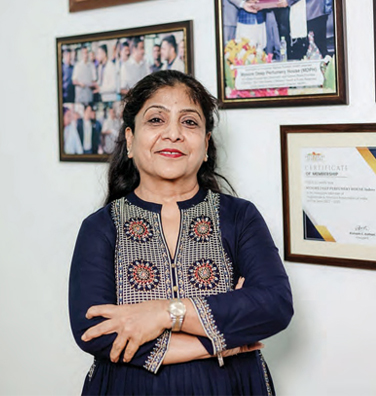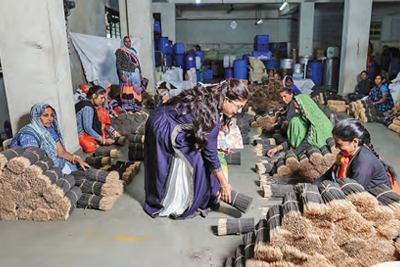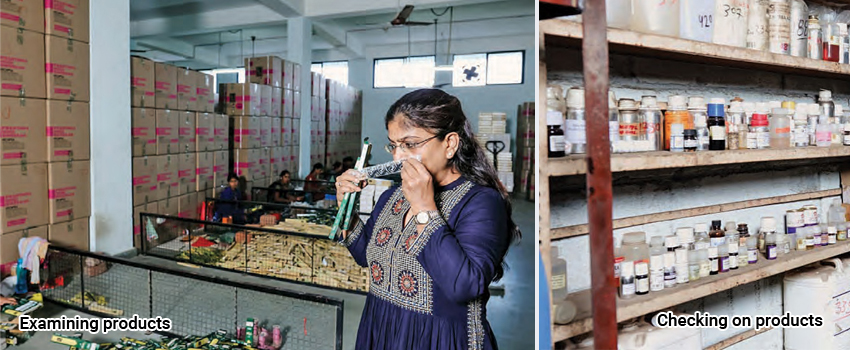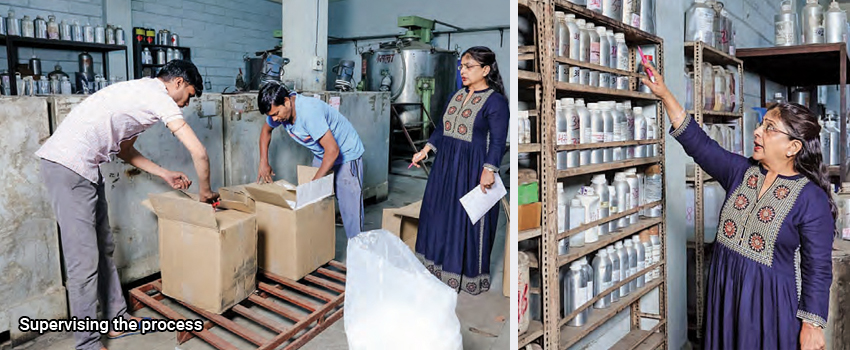A Self-Reliant Entrepreneurial Journey

The transition of a housewife from a traditional ‘Marwadi’ family to helm the fort as Director of the Rs 500 crore Mysore Deep Perfumery House (MDPH), is a story of self-empowerment. Amita Agrawal’s journey also echoes the strength of its empowered 80% women workforce across the company’s manufacturing plants. The Indore-based MDPH is an established company, operating for the last 30 years in the Rs. 7000 crore Indian agarbatti (incense stick) sector. It is recognized for its flagship brand, Zed Black incense sticks (agarbatti), and a range of in-house multi-brands. Amita stepped into the business not as a choice but as a need to steer their fragrance manufacturing unit in 1999, heading the perfumery division, and developed 150+ in-house formulations. She has since broken conventional norms, stepping out of her role as a housewife for 15 years and gradually transforming into her corporate role. She draws inspiration from her mother-in-law while wearing multiple hats as a mother, grandmother, and daughter-in-law, with equal poise.

“The perfumery division is integral to our agarbatti (incense stick) manufacturing unit. The final step in the agarbatti-making process is to dip the sticks in the fragrance solution and left to dry. My specific responsibility ensures the required quantity of the fragrance blend to be available for the incense sticks manufactured daily. In a day, we incorporate multiple fragrances, as per requirements,” said Amita Agrawal, Director of Mysore Deep Perfumery House (MDPH). The company manufacture several brands across agarbatti (incense sticks), dhoopbatti and products for traditional pooja needs. They produce hand sanitizers and handwash, edible oils, essential oils, packaged tea, mosquito coils, natural hair colour, soya chunks, and confectionery.
The Launch Pad
Born in Hathras (UP) and armed with a Bachelor’s Degree in Arts, she married Prakash Agrawal, Co-Founder of MDPH, in 1984. Although the first 15 years of her married life aligned with conventional roles, her husband’s confidence in her ability to train and gain finesse in the art of perfumery eventually paved her path to more responsible roles within the perfumery unit.
In the perfumery sector, most ingredients’ formulas and names are in English. Prakash Agrawal tapped Amita’s proficiency in the language, enabling her to gain knowledge in the nuances of perfumery linked to their core business of manufacturing hand-made incense sticks. “At the time, there was a requirement for a trusted family member to manage the perfumery division. My husband put me in charge of the fragrance manufacturing unit, and I embarked on my journey in 1999, not as a choice but to fulfill an essential business need”, she said.
The Indore-based MDPH runs 7 manufacturing facilities in India comprising of 4 units in and around Indore and 3 franchise manufacturing units in Cuttack, Raipur, and Jaipur. They execute a daily production quota of 30 Lakh incense sticks in their primary manufacturing space in Indore. They run 36 company-owned depots nationwide, 35 regional sales offices, selling 15 lakh retail packs daily. It sells 1200+ products, with an export market across 30+ countries.
Corporate Citizen interacted with Amita Agrawal, who has been fulfilling her responsibilities for almost 24 years, also paving the way for a strong women workforce across their manufacturing plants.
Early Transitions
"Perfumery involves old family traditions and comprises secret formulations. Therefore, it is usually overseen by trusted family members as the formulations developed are often the trade secrets that govern a part of the business, especially in making agarbattis"
Corporate Citizen: What triggered your entry into MDPH’s perfumery division?
 Checking on the women workers
Checking on the women workers
Amita Agrawal: I married into the family in 1984, but my journey with the Mysore Deep Perfumery House (MDPH) Perfumery Division began in 1999. I was not employed anywhere before my marriage, and post-marriage looked after my household and supported my husband, Prakash Agrawal. I am a BA graduate, and since most of the formulas and ingredients names are in English, my husband decided to tap my talent for business enhancements. It was critical to have a trusted family member to helm the perfumery division, which is time-consuming and requires extreme precision and immense concentration. I was equipped to fit the requirements in every possible way and stepped into the business.
CC: What other criteria qualified you to join the perfumery division?
Perfumery involves old family traditions and comprises secret formulations. Therefore, it is usually overseen by trusted family members as the formulations developed are often the trade secrets that govern a part of the business, especially in making agarbattis (incense sticks).
CC: What inspired you to learn and grow in the initial stages?
I have seen and been aware of my husband’s hard work and efforts in establishing the business since 1992, which started from the premises of a garage. Having him as my mentor and guide paved my path in handling the perfumery unit and gradually into the greater aspects of the business. The other inspiration has been my mother-in-law, who has been an integral part of MDPH since its inception. It was her work ethic that motivated me to work harder toward the success of the company. She is in her late seventies but regularly visits the office, interacts with the workforce, spends time with the units on special occasions, and continues to be my primary driving force.
CC: How have your key responsibilities transitioned over the years?
My journey with MDPH’s perfumery division began around 1999-2000, and my initial responsibility was to create and blend perfumes for the company’s agarbatti range. My responsibilities include understanding the fragrances’ formulas, which is one of the most critical steps in creating the perfect blend and arriving at the appropriate fragrance tones. I steer my team to develop new fragrances or concepts for the company’s agarbatti and dhoop sticks based on customer feedback, market trends, sales force requirements, and several other parameters. We have created specific fragrances, including fruit and spice, camphor, and aromatherapy- led fragrances. The constant experimentation, research, and development have enabled the company to bring forth sub-branding in all our product categories, including the umbrella brand Zed Black. It enabled us to offer product variations as with ‘Zed Black 3’ in 1 or the ‘Manthan’ range of dhoop and dhoop batti, including ‘Manthan’ sambrani cups. Likewise, we have developed Aarogyam Camphor, Zed Black Pineapple, Shriphal, Gauved Sambrani cups, Aromix, Nature Flower and Iksha, and many more to cater to all levels of the agarbatti market.
CC: How did you train as the perfumery process is scientific and has aesthetics too?
In the initial phases, my husband taught me the basics, and I gradually picked up the nuances while working in the factory and eventually mastered the art. Over the years, the R&D team at MDPH has been working on fragrance blends which are a closely guarded secret. These are proprietary blends specially designed for MDPH and its product range. The R&D team introduces new and unique fragrances every year. It could range from fruity tones to those of natural flowers, and I have developed the Aromix concept, blending two fragrances on a single stick, which is a part of my skills and repertoire.
Building Business Sense
"I have seen and been aware of my husband’s hard work and efforts in establishing the business since 1992, which started from the premises of a garage. Having him as my mentor and guide paved my path in handling the perfumery unit"

CC: How do you protect your recipes, especially with a labour-intensive workforce?
The recipe blends or formulations are known to a team of trusted individuals who comprise a handful of people across the company. The recipes are a well-guarded secret amongst the core team at the company’s management levels.
CC: Are the fragrances developed exclusively for the agarbattis, and do you manufacture allied aromatherapy products?
We create fragrances for all the MDPH agarbatti and Dhoop brands. However, during the Covid pandemic, we also introduced handwash. With its unique pineapple blend, the handwash became a hot seller in the market. We have also developed an essential oils diffuser range called Orva. We have since launched six sub-fragrance tones under this product category, which includes scents derived from jasmine, rose, sandalwood, bergamot, lemongrass, and lavender.
CC: Is MDPH a part of cottage industries/ MSME?
Agarbatti has always been a cottage industry because the sticks of agarbatti are generally made by hand, and it comes under the government’s description of the handicrafts sector. However, MDPH has grown from a cottage industry to an MSME (Micro, Small & Medium Enterprises).
CC: How has businesses transformed in the sector?
MDPH has been an established entity in the agarbatti sector for the last 30 years, but we are a recent entrant in the non-agarbatti range of products. Over the years, we have seen several changes in the agarbatti sector, including product packaging as a key change criterion. Initially, the customer demands have been for huge bulky boxes or packets, but in recent times, the demand has been for smaller packets with subtle designs. The market shift is seen for anglicized product names but with the underlying demand for a quality product, irrespective of packaging or product brand name.
"In the initial phases, my husband taught me the basics, and I gradually picked up the nuances while working in the factory and eventually mastered the art. Over the years, the R&D team at MDPH has been working on fragrance blends which are a closely guarded secret"
CC: How have consumer transitioned in their preferences?
There have been transitions to consumers’ preference for fragrance blends over the years. While traditional fragrances, including Gulab, Mogra, and Chandan, continue to be popular, the modern generations are keen to experiment with fruity fragrances like pineapple or fusion fragrances like apple-cinnamon, including camphor- based incense sticks. Change is the only permanent thing, and we have been acclimatizing to the acceptable changes in the markets and developing consumer-led fragrance blends across our products.
CC: What is the workforce makeup?
The company has been investing in state-of-theart manufacturing units in Indore (MP), comprising 80% women workforce, and includes women handling 100% of our machines for manufacturing agarbattis. Women head three key departments in our firm. MDPH is based in Indore, and we have employed women from nearby villages who do not have to travel far to reach the workplace. We also kept employment avenues open for people during the pandemic, especially for migratory workers and those returning home after job losses across cities.
CC: How have you distributed production facilities across your plants?
We have product-led manufacturing arrangements and are currently setting up new manufacturing facilities. We are working on a blueprint for Zed Black to execute two new manufacturing units in Indore, at Rampipliya and Kshipra village. The greenfield units have added additional manufacturing space of 5.3 lakh sq. ft. to the existing 7 lakh sq. ft. area. The greenfield Rampipliya unit, comprising 3.5 lakh sq. ft., is one of the world’s largest raw agarbatti manufacturing plants. The new greenfield Rampipliya unit, over a constructed area of 3,50,000 sq. ft., is a strategic attempt at backward integration that will also manufacture raw materials, including raw agarbatti, dhoop cones, dhoop sticks and ‘hawan samagri’ (ritual needs) in its basic raw forms. The Kshipra plant has a manufacturing space of 1.8 lakh sq. ft. We expect to generate 2000 new employment opportunities between the two plants.
CC: What is the purpose of your franchisee manufacturing units?
The franchisee units at Cuttack, Raipur and Jaipur are not much different from the main manufacturing facilities. They produce the end-products which are then sent out for distribution in the respective areas.
CC: How do you plan to leverage your new manufacturing capacities?
The new factory layout will support Zed Black’s expansion plans and will cater to the changing preferences of consumers in India. The rising popularity of our domestic and international products has propelled our urge to grow bigger, and we are optimistic about the future.
CC: What is your product development strategy?
We strive to introduce new fragrances and concepts in the constantly evolving Indian agarbatti industry. Our innovative concepts led to pineapple fragrance as one of our best sellers, and the Parfum series is based on various wellknown perfumes. Our most recent Aromix series is a blend of two different fragrances. I keep testing new fragrance combinations to suit the market. We have launched the ‘Samarpan’ range that includes a product portfolio encompassing fragrances including camphor, bhimsaini camphor, chandan tika, diya batti, sambrani dhoop cups, agarbatti, puja oil, and targeted at diverse consumer needs for daily prayers. Our latest offerings are a range of Cian incense sticks in five fragrances, including ivory, marine, marigold, rose, and lavender. We have developed a bamboo less agarbatti, to be launched shortly, and several other research-based innovative products in the pipeline.
CC: What has been your branding strategy, especially with the anglicized brand names?
Even though we sell products catering to the Indian’ pooja’ ritual needs, we did not want to promote products using images of gods. Since the company’s inception, we have thrived on being different in our product portfolio or how we brand our products, working towards a USP not available in the existing market.
CC: Can you explain your purpose-driven brands and the related concepts?
We have been creating sustainable product options and one such introduction has been via our brands including Nature Flower. The initiative collaborates with HelpUsGreen, an NGO, who have been cleaning up various temple sites across India by collecting the leftover flowers. We process these flowers and recycle them into fragrant agarbattis. We have also tied-up with a gaushala (cowshed) in Dhulia in Maharashtra for making our ‘sambrani’ cups from cow dung.
Leveraging Women Power
"Even though we sell products catering to the Indian’ pooja’ ritual needs, we did not want to promote products using images of gods. Since the company’s inception, we have thrived on being different in our product portfolio or how we brand our products, working towards a USP not available in the existing market"

CC: What is the composition of your woman workforce?
We have an 80% women workforce, including local women from nearby villages. Many of our women workers have introduced other members of their extended families to join our factories. We have empowered local women and given them a sense of financial freedom. We prefer women as I believe and have seen that they are more hard-working than men and take fewer breaks which have helped maintain the production levels. Our manufacturing units’ retention level is high as we have provided a safe working environment.
CC: What is the skill level of the women workforce across your plants?
Unskilled women from nearby villages primarily join our company. We train them to use the machines that manufacture agarbattis and other allied products.
CC: What are the core activities involving women across your plants?
Women workers are primarily engaged in activities that assort, roll, dry, and process flowers to make incense sticks, constituting 80% of the workforce in the factories. It has enabled them with stable livelihoods and created a sense of empowerment. They are trained meticulously on tasks including hand rolling of agarbatti and bamboo splitting and also briefed about machinery, its usage, and packaging parameters.
Workforce Empowerment
CC: Has employing women helped socio-economic growth within the community?
The women workforce at our plants have been empowered, leading to a commendable socio- economic change at the grassroots levels. These women receive their salaries in their bank accounts, and they have complete accountability for their work. It has enabled them to seek loans, build capital and have a say in their respective households.
CC: What is your viewpoint on women entrepreneurship in Tier 2 cities?
The interconnectivity and people getting used to the internet have led to multiple entrepreneurial opportunities across Tier 2 and Tier 3 cities. It is a good sign that women now have the opportunity for prominent roles at work or are even starting their businesses which is a boon to the Indian economy. The change is a fallout of the overall societal acceptance that a woman can be equal to a man in terms of running their own businesses or pursuing any skilled or unskilled jobs.
Paving Through the Pandemic
CC: Did the pandemic impact your business?
Thankfully, the agarbatti industry did not suffer much during the pandemic. On the contrary, it saw increased sales during the pandemic. As people were at home with families, they prayed a lot, and that faith enhanced the sale of agarbattis and the demand for home fragrances. During the pandemic, although the manufacturing units were shut for a short period, many of our employees who lived near the factory kept up with production. We followed all the covid protocols and managed Covid cases to a bare minimum without impacting our production.
CC: Did you attempt any innovations during the pandemic?
Yes, we launched the Product Development and Modern Trade units. We have empowered women below 40 years to head the two new departments.
Juggling Work-Life
"We do not run full-fledged CSR projects, but we have always had CSR incorporated into our daily factory work. Of our total 3500 employee strength, about 80% are women workforce. From the company’s inception stages, we have deployed predominantly unskilled women as part of our workforce"
CC: What are the prime challenges you overcame as a women entrepreneur?
The company’s manufacturing units are based in Indore and the surrounding areas, and therefore I do not need to travel to the various manufacturing units. Also, my department is based in the headquarters. The primary challenge in heading the perfumery division is to consistently develop unique and new fragrances for the products. It entails rigorous R&D, and my team has to approach a focused mindset in ensuring that we prepare the right amount of solutions needed for our multiple product categories and sub-brands. However, the most difficult stance as a woman entrepreneur has been to ensure a suitable work-life balance.
CC: How has work-life balance challenged you?
I joined the profession when there were few or almost nil culture of women from Marwadi households actively participating in the business. Even during my initial years in the business and learning phases, we did not have help at home and did all our household chores ourselves. The prime challenge that I overcame has been to find the right balance between my work life and my time. I have to juggle daily between being an entrepreneur and playing the roles of mother, grandmother, daughter-in-law, and wife. I have ensured that I give quality time to my family, spend time with my grandchildren, look into household activities, and much more. Most importantly, I have worked towards a balance such that neither the home nor the office has been compromised. This balance between work and personal life makes me strive harder to lead a complete life.
CC: How have you balanced your work-life?
Work and my family are the highest priorities in my life. Four generations live under one roof, including my in-laws, children, and grandchildren. When I am at work, around 5-6 hours are dedicated to creating new fragrances and concepts for the agarbatti business. My day is also scheduled to care for my 80+-year-old in-laws. I like to meet my friends, go to the movies, and spend valuable time with my grandchildren, enabling a satisfactory existence.
CC: Has your work-life attitude influenced the company’s women workforce?
We have an 80 per cent women workforce, and it is heartening to see the women taking initiatives and decisions that have improved their lives.
Future Sense
CC: Do you run CSR projects?
We do not run full-fledged CSR projects, but we have always had CSR incorporated into our daily factory work. Of our total 3500 employee strength, about 80% are women workforce. From the company’s inception stages, we have deployed predominantly unskilled women as part of our workforce. The underlying belief is that if a woman is strong and self-reliant, it reflects on the family and has a positive impact on the company as well.
CC: What are your plans for the next five years?
We strive to be the number one player in India and enable international exports across 100+ countries. We seek to expand the ‘pooja samagri’ (ritual needs) range. We have recently ventured into the pooja needs (ritual needs) category and have seen good responses for camphor tablets, puja oils, and Chandan (sandalwood) tikka. We plan to increase the product range as post-Covid, the consumer shift has been toward branded products in this category too. The confectionery and essential oils segments look promising, and we hope to grow them too. It includes our diversification into the confectionary segment with the launch of our brand Din-Din across a unique range of hard-boiled candies, jellies, and lollypops. There has been a good response from customers and are working hard to provide a good product in this market.